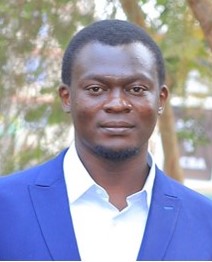May 16th 2024
CARE’s Young Researcher – Collins Owino
CARE’s Young Researchers – Introducing Collins Owino, Post-doctoral researcher, Utrecht University
Read about how Collins’s work in understanding how the coronavirus hijacks human host factors and processes has provided us with opportunities to develop therapies to inhibit viral replication.
CARE (Corona Accelerated R&D in Europe) is the largest European research initiative addressing the challenges of COVID-19. It comprises 38 partners, from both industry and academia, in a set-up of eight multidisciplinary work-packages (WPs). In this series, we highlight the work of some of the young researchers involved in CARE as part of their PhD or postdoctoral work. Here, we learn how this opportunity has benefited Collins (Utrech University), while simultaneously benefiting CARE and its ambition to help society defeat COVID-19 and future pandemics.

What experience did you have working on a Public Private Partnership before joining CARE?
I had no experience in Public Private Partnership before joining CARE but members of our team have participated in such projects before.
Why did you decide to get involved in CARE?
I decided to get involved because I had just experienced the devastating effects of the SARS-CoV-2 pandemic during my Ph.D. studies. I wanted to contribute to a better understanding of the interaction between the virus and human host factors towards developing novel antiviral drugs and vaccines.
How did your involvement in CARE come about?
I became involved in CARE because of my experience studying virus-human host interactions, which aimed at identifying host factors regulating viral infection. We wanted to apply different CRISPR screening strategies to identify novel host factors regulating SARS-CoV-2 infection that could be drug and vaccine targets.
Tell us about the work you have been doing in the CARE consortium
My role in the CARE consortium involves performing loss of function screens using CRISPR interference (CRISPRi) (a novel approach for targeted silencing of transcription in cells/gene knockdown – see https://www.nature.com/articles/nprot.2013.132) to identify novel host factors regulating SARS-CoV-2 infection and other coronaviruses. We further apply different RNA interference approaches to validate the role of the newly identified host factors during the virus infection cycle. In addition, we work with other collaborators within the consortium to identify small molecules that could inhibit these factors for possible host-targeting antivirals. We are currently at the final stage of validating some top hits.
What highlights can you share from your time in the CARE consortium so far?
Some highlights from my time in CARE include learning how to work together within a collaborative environment to meet the general goals of CARE. It has also been fulfilling to be an integral member of our team that has conducted several CRISPR screens and validated the newly identified hits to develop host-targeting therapies against coronaviruses.
Why does this work matter?
This work matters because understanding how the virus hijacks human host factors/processes provides us a better opportunity to develop therapies to disrupt these interactions, thereby inhibiting viral replication.
What are or were the biggest challenges you have experienced (and how did you overcome them?)
During my Ph.D., I studied the biology of the hepatitis B virus. When I joined the RNA virus virology group at Utrecht University, I experienced a significant shift in the techniques and experimental procedures for the CARE project. I overcame these challenges quickly through the support and mentorship of my colleagues at UU.
How have you benefited from your involvement in CARE?
I have benefited immensely by interacting with experienced industry and academia experts who are willing to mentor and guide the upcoming scientists within the consortium. I have been able to sharpen my technical as well as interpersonal skills since I joined the consortium.
What advice would you give to someone getting involved in a Public Private Partnership?
I would tell them that PPPs require collaboration, trust, and a shared commitment to achieving positive outcomes for public and private interests. They provide a noble opportunity to learn from the members of different teams in an open, transparent, and collaborative environment. It is a great experience.
